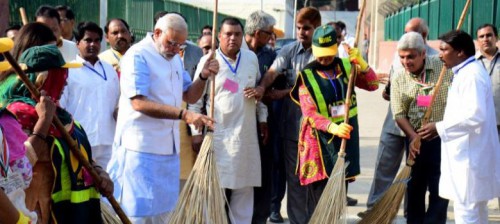Posted by Alliance of Indian Wastepickers
Written by Bharati Chaturvedi
Region Asia-Pacific
Country India
November 24, 2015
Written by Bharati Chaturvedi. Scroll.in. 11/19/2015

We’re now paying a Swachh Bharat Cess, as a result of which the service tax rates have gone up from 14% to 14.5%. The question everyone is asking is: How should these funds be spent? It has a simple answer. Let us just focus on solid waste, or trash.
If the Swachh Bharat Abhiyan is to keep up with the public support it has received, it must show results on the ground – the kind of results that people see in their everyday lives, in their own neighbourhoods.
Overall, more than 60% of the solid waste produced in India is organic. It can be turned into compost with appropriate treatment. But left alone, this waste starts stinking, releasing greenhouse gases, and offering a home for flies to lay eggs. What could be a more sensible solution than to invest in composting?
But we need to be careful here as centralised composting facilities won’t solve the problem as is apparent from the case of pampered Delhi. My colleague Seth Kolker, who interned with Chintan, studied the city’s experiments with centralised composting. A plant at the Bhalaswa landfill processes some 350 to 400 metric tonnes per day, or TPD, of waste. A facility at Tikri Khurd can handle 125 TPD but is being expanded to 200 TPD. A third plant nearby the Okhla landfill processes another 200 TPD, for a total of about 700 TPD.
Theoretically, working optimally, they take care of only 16% of the compostable waste – 84% of the available supply goes to – well, waste. Few other cities have the unique advantage of three compost plants. Even with this infrastructure, Delhi’s organic waste is unable to be adequately handled. As India rapidly urbanises, many more towns and cities will come up and generate even more waste.
We need therefore to think of smart ways of using this cess to help in addressing the organic solid waste of these towns and cities.
Decentralised composting
Decentralised composting is a strong alternative to centralised composting. It substantially cuts down the cost and pollution of transporting a substantial portion of the waste to a centralised plant. Based on local initiatives and monitoring, it is also far less polluting because it does not involve spending hours mixed with hazardous and other waste.
In cities like Pune and Bangalore, community composting is becoming a way of life. However, for middle class citizens, the greatest producers of waste, such composting facilities are far more expensive than they can afford. Continued here…
Tweet

